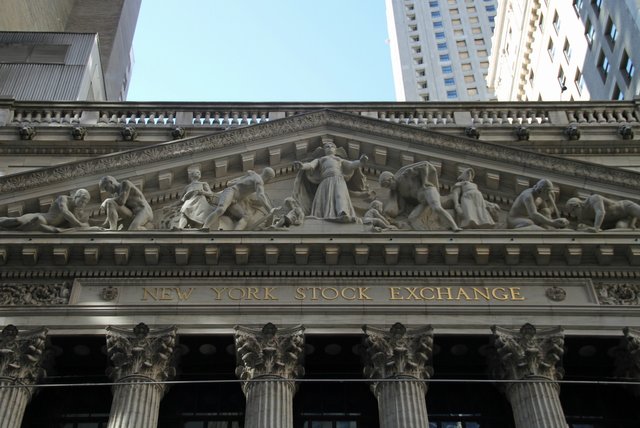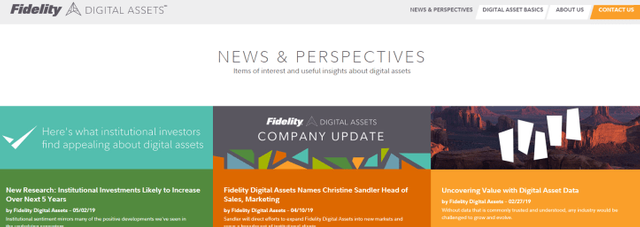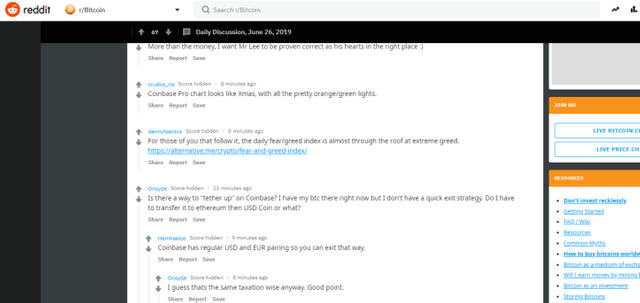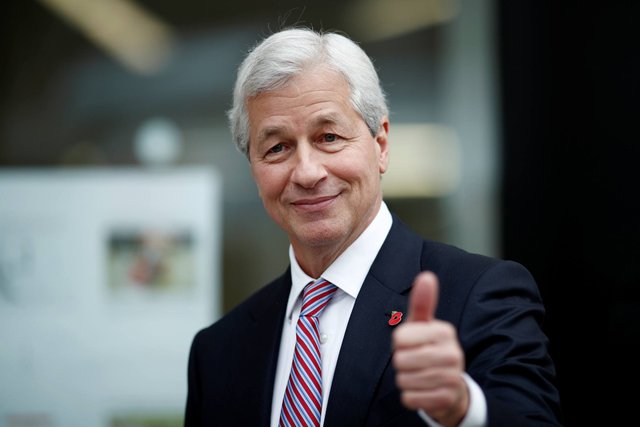Once Wall Street Starts Telling Its Story, Everything About Cryptocurrency Will Change

This is the fourth in a series of articles sharing my thoughts about the entry of traditional finance into cryptocurrency markets. See the full series on this page.
News flash: this past Tuesday, U.S. regulators approved the first physically-delivered bitcoin futures contract for LedgerX, a highly-regarded bitcoin derivatives exchange.
This comes on the heels of TP ICAP, the world’s largest inter-dealer broker, trading bitcoin futures on behalf of its clients and Bakkt nearing a now-inevitable July opening.
If you didn't hear about any of this, it's ok. Most people missed it.
When you're in full-FOMO over a $13,000 bitcoin, that's what the news is going to focus on. It's certainly the obsession of Crypto Twitter and Reddit.
I have no qualms about hyping a bitcoin moonshot, but this news is far more consequential---not just for the blockchain industry, but also for your long-term chances of getting rich from cryptocurrency.
Hello, Wall Street. Welcome to crypto!

Howdy, Wall Street! Nice to see you again. Did you bring your friends?
Fidelity was the first traditional Wall Street institution to create a cryptocurrency platform for institutional investors. TD Ameritrade, E-Trade, and Bakkt plan to follow. Rumors suggest NASDAQ plans to enter the space soon, too (it already has crypto indices and data platforms for institutional investors, as well as a trading platform for security tokens).
If you think this means massive amounts of money are about to flow into crypto markets, you may be right. But I'd caution against getting wrapped up in the "institutional investors will send prices to the moon!" narrative.
That may (will?) happen, but there's a larger story you need to pay attention to.
Here come the professional money-makers
Look at the landing page for Fidelity's cryptocurrency services:

Screenshot of Fidelity's crypto page on June 26, 2019.
What do you notice?
No mention of bitcoin, cryptocurrency, or prices. Sleek display with clean lines and muted colors. Words like "news" and "perspective." Opinions that are framed as facts and sprinkled with data.
This is the epitome of professional marketing content. It's everything I learned in political and business communication---skills and knowledge I apply at my day job (and fortunately can ignore when I blog).
Now read this bitcoin primer:

Excerpt from Fidelity's bitcoin primer.
What do you notice?
A well-written, balanced explanation of a new, potentially lucrative asset class. Read the whole thing on Fidelity's website.
Contrast those websites with bitcoin Reddit:

Bitcoin Reddit
If you're young and cool, you're probably scratching your head like "what's the difference?" You may even like the Reddit feed better than anything Fidelity put out.
Wall Street doesn't care about you. It cares about your parents, grandparents, investment funds, and portfolio managers---people who have a lot more money than you (and care about it a lot more more than you do).
These people do not take advice from a random Reddit thread.
Suits, not lawsuits

Who do you think your parents would rather trust with their money?
As a digital native, you probably have no problem with the messy, personal content you read on the internet. It's unprofessional, zany, informal, and haphazard---usually posted on a bulletin board or blog that's cluttered with ads, links, and images.
Wall Street's money comes from people who are not digital natives. Your average millionaire is 61 years old, your average stock holder is 56 years old, and your average portfolio manager is 49 years old.
For the most part, these people don't want messy, personal information from random bloggers and outrageous internet personalities. They want professional advice from mature experts with experience, perspective, and demonstrated history of success.
They have money and obligations. Individual investors usually just want to cover medical expenses and grow their wealth for their children and grandchildren (and possibly their elderly, dependent parents). Pensions, endowments, and investment funds usually have rules that prevent them from putting money into risky investments of any kind.
Few will buy a speculative asset like bitcoin.
As a result, Wall Street can't make a lot of money offering cryptocurrency-related services to these people (even if John McAfee says bitcoin will hit $1 million by the end of 2020).
Yes, Wall Street can collect some fees and commissions from smaller investors or funds that want to buy a little crypto, but that's not enough money to fund the massive investments in security, marketing, operations, and regulatory compliance necessary to bring cryptocurrency to the masses.
Unless...
Wall Street can change people's perception
From a pure investment standpoint, bitcoin shares the qualities of gold, oil, and many other commodities---violent swings in price over the short run, with no correlation to anything going on in the stock or bond markets.
For that reason, most managed portfolios include some of these speculative assets. In fact, if you believe in the Nobel Prize-winning investment approach called modern portfolio theory, you must own some. That's why Yale, Harvard, MIT, several pensions, and the Rockefeller family already have a little crypto in their portfolios.
It's ok for bitcoin to be speculative and wild.
It's not ok for bitcoin to be fake, useless internet money, as it's commonly perceived.
One 60 Minutes segment won't change that perception. But what about a sustained, multi-year marketing and communication effort by large, established Wall Street brands?
That just might.
Fortunately, Wall Street is great at that.
Winning hearts and minds

Wall Street to Main Street: this could be you one day.
Fifty years ago, stocks were considered risky bets, basically gambling for rich people.
Then Wall Street created mutual funds, diversified portfolios, and tax-sheltered investment accounts. Stocks became safe, long-term investments.
Now, many people entrust their entire retirement to the stock market. Pensions put a big share of their funds in equities. Even some banks and annuity companies hold stocks as reserves.
Wall Street changed the narrative.
Thirty years ago, commodities were considered a playground for traders and speculators, not suitable for a legitimate investment portfolio.
Then Wall Street created ETFs as a convenient way to "gain exposure" to commodity prices. Commodities became "alternative assets" you could sell whenever the prices went up, on demand with the click of a mouse.
Now, commodity ETFs are part of almost every investment portfolio. Once unthinkable, now standard.
Wall Street changed the narrative.
Ten years ago, the world economy was in ruins, largely because Wall Street moved trillions of dollars into risky investments thinking they were safe. Protests and demonstrations broke out across the country. U.S. government had to give banks and investment institutions $5 trillion to keep the financial system from collapsing.
Then, Wall Street booked record profits from a bull market that's lasted for over a decade (largely thanks to that $5 trillion hand-out).
Now, everybody's gloating about a strong stock market, well-capitalized banks, and surging financial companies. One major political party now advocates for less oversight and less restrictions on Wall Street while the other grudgingly (quietly) goes along.
Wall Street changed the narrative.
Rinse and repeat with crypto

Jamie Dimon, creator of Wall Street's first cryptocurrency, JPM Coin.
Once Wall Street gets its feet wet with crypto, they'll say "hey, remember 2017? The markets were awash with scams and frauds. We came in and cleaned the place up. It's safe now. Buy bitcoin (but buy it from us, not Coinbase, you can't trust them)."
Wall Street will do this because it needs to. It's the only way to get that flood of money necessary to build out products and services for cryptocurrency investors.
If this seems hypothetical, look back at the Fidelity snippets I shared above. Now check out the websites for cryptocurrency businesses Bakkt, ErisX, and Circle (all subsidiaries of Wall Street firms).
Slick, clean, polished, well-written---and very pro-crypto.
Wall Street is planting the seeds.
Why you should care
Wall Street has a lot of money and power. Once it gets into the cryptocurrency markets, it will probably use this money and power for influence---marketing, lobbying, and networking.
At that point, everything will change.
Maybe it will ask your government to force you to use an "authorized entity" to hold your crypto instead of letting you hold your own cryptocurrency in your own wallets. That authorized entity would have to meet certain requirements---requirements that only a Wall Street firm could meet. After all, we can't let bitcoin fall into the hands of criminals and terrorists, right?
Or it might lobby for governments to allow commingling of cryptocurrency with other assets. This is common with paper assets because it lets Wall Street create new financial products---i.e., new ways to make money---but it introduces massive risks for cryptocurrency markets.
Maybe Wall Street will get the U.S. government to give it sole control over airdrops, ICOs, STOs, IEOs, and other activities that result in new cryptocurrency? Perhaps it will even shut out normal people from getting in on these offerings, like it has shut average Americans out of private equity markets.
Or, maybe, Wall Street will try to control access to cryptocurrency like telecommunications companies control access to the internet under the guise of promoting innovation. Imagine new laws that let Bakkt or Fidelity serve as your "cryptocurrency service provider?"
It's possible Wall Street firms will buy up all the small cryptocurrency exchanges and custodial wallet providers, integrating their wallets into new payment networks while shutting out light wallets. No more private keys.
And what happens when Bakkt sets up a node on the Lightning Network?
Wall Street talks, people listen

A crypto megaphone?
You may hate Wall Street, but you can't deny its influence. Your mom will never open a Coinbase account, but she'll let her financial advisor buy $100 worth of a bitcoin ETF "just in case" it booms.
Once people start to trust Wall Street with their crypto, Wall Street will try to make money off of their trust. Then they'll look for ways to protect and grow the power that comes from earning people's trust.
It's just what they do. I've seen this time and time again. So have you.
Frankly, we don't know how any of this will play out. Having worked on Capitol Hill, I know every big special interest has another big special interest trying to stop it from getting what it wants. Maybe Wall Street gets cut off and remains a marginal player in the cryptocurrency markets?
Maybe, but I doubt it.
Wall Street has a big voice, hordes of lobbyists, and well-connected advocates all over the world. It knows how to tell a compelling story and has all the money it needs to buy advertisements and positive PR (I guestimate $2+ billion based on a hodge-podge of marketing industry data).
Now, it has another way to line its pockets with your money.
Are you ready for that?
—
Mark Helfman is a cryptocurrency commentator and author of Consensusland, a Readers’ Favorite 5-star book about a country that runs on cryptocurrency.
Posted from my blog with SteemPress : https://markhelfman.com/2019/06/28/once-wall-street-starts-telling-its-story-everything-about-cryptocurrency-will-change/
Well, one is a super intelligent person who understands computers and digital security. The other is a model in a suit.
Why are they called brokers? Because they are broker than you.
And, if we didn't have wall street sucking up everyones wealth, then the best investment plan for little people is to stuff money under the mattress. Good money increases in value over time.
Short the bankers, long bitcoin (and Steem).
Posted using Partiko iOS